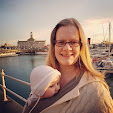So when did I say I was going to sit down and sort my messy notes out? Tomorrow? Well. At least the last two weeks' pile is a neat one, and I've started the next two weeks' one, but really am too tired to sort them out.
 What do you expect from life with a toddler that chooses to wake up at b*** 4.30 am to demand "passa! naane! kisch! tuti!" (pasta, banana, juice, treat; G-G-N-S), and by the time she's been fed "binne! wooty!" (birne, fruity; G-E) decides it's time to get up and party (respectively, keep crawling over mum's head, face and generally upper body while mum is trying to ignore the 13 kilos on her face, that elbow in her throat and that slobbery snout slobbering onto her face from really close up). Her chattiest time of day? Stupidly early in the morning, i.e. the inconvenient end of night.
What do you expect from life with a toddler that chooses to wake up at b*** 4.30 am to demand "passa! naane! kisch! tuti!" (pasta, banana, juice, treat; G-G-N-S), and by the time she's been fed "binne! wooty!" (birne, fruity; G-E) decides it's time to get up and party (respectively, keep crawling over mum's head, face and generally upper body while mum is trying to ignore the 13 kilos on her face, that elbow in her throat and that slobbery snout slobbering onto her face from really close up). Her chattiest time of day? Stupidly early in the morning, i.e. the inconvenient end of night.(See also here.)
"Mama Bett. Papa Bett. Kacha (Tara) Bett. Up/Ab! (R)unter!" (GG.GG.GG.E/G.G) just being the easily recognizable part of her speeches: We're all in bed (as we should be) but let's all get up now and go downstairs - at 4.30 I don't think so. Neither do I have pen and paper to catch any of this cold verbal shower. Talking of 'catch' - that's a new favourite, and Tara's perfect excuse to go about slapping people. "Catch booboo!" *slap! mum on chest* "Catch Mama!" *slap! mum in the face* "Aame catch!" *slap! Tara on arms*
"Catch" is English. Clearly nothing to do with the good manners I try to teach her, or else it would be German ;-). "Ey!" spricht Mama. "Hier wird nicht gehauen!"
Anyway, what with the lists a mess for now, I'll share yesterday's notes, shall I? (21m)
New words and phrases observed:
E - poorly, dam (jam), come on!, t-shirt, cuddles, I-see-ya, one-two-free (1-2-3), daddy
S - cama ('bed')
G - Fe'a (Feder, 'feather')
Clever things said ;-)
E - "Baby poorly - Baby sick-sick-sick" - "Papa dam (jam) all-gone. Finished!" - "peekaboo - I-see-ya!"
S - "guau-guau culo" ('doggy's bum') -
G - "Papa make siek" (Papa makes music, N-E-G) - "Lecker Papa alle-alle" (She says 'lecker' (tasty) for 'yoghurt, daddy's yoghurts are finished) - "Papa kuscheln" (cuddle daddy) - Mamis Jacke (mum's jacket) - Mamis Hand (mum's hand)
Mixed - "Kötzene tuck!" ('Klötzchen stuck', her bag of play blocks were stuck, G-E) - "Fünlück all-gone" ('Frühstück all-gone', breakfast is finised, G-E) - "guau-guau ball come-on" (doggy ball come on, S-E-E) - "Finished, Mama!" (Finished, Mummy, E-G)
Isn't she clever ;-)
I was most amused when she came out with a whining 'Eh! Eh! Come on!" when I was trying to get some rest on the sofa and the midget disagreed; Jose was least amused with being referred to as 'daddy'.
Talking about rest, time to go to bed. Armed with a pear, a treat and a banana, and all fingers crossed for a night that ends at nearer to 7 than 4.30!








